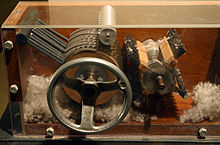The Boston Tea Party

In Boston, on December 16, 1773, the Sons of Liberty, a group of protesters, destroyed a supply of tea that had been shipped to Boston. They were protesting the Townshend Acts, a series of acts that the British parliament had passed instituting various taxes on the American colonies. Part of why the industrial revolution began in Britain was because of Britain's colonial empire; factories in Britain would manufacture goods and then sell them in the colonies with little competition. Though this system satisfied the British and helped to spur the industrial revolution, it wasn't always appreciated in the colonies, leading to events like the Boston Tea Party and, eventually, the American Revolution.
The Invention of the Cotton Gin

In October 28, 1793, an American inventor, Eli Whitney, applied for a patent on the cotton gin he had invented. His machine quickly separated cotton fibers from their seeds. Prior to Eli Whitney's invention, this was done by hand, and took much more time. Just as many different inventions played a role in the industrial revolution in Europe, Whitney's invention revolutionized the cotton industry in the US. The cotton gin greatly increased the productivity of cotton farms. However, the cotton gin also led to the growth of slavery in the US.
No comments:
Post a Comment